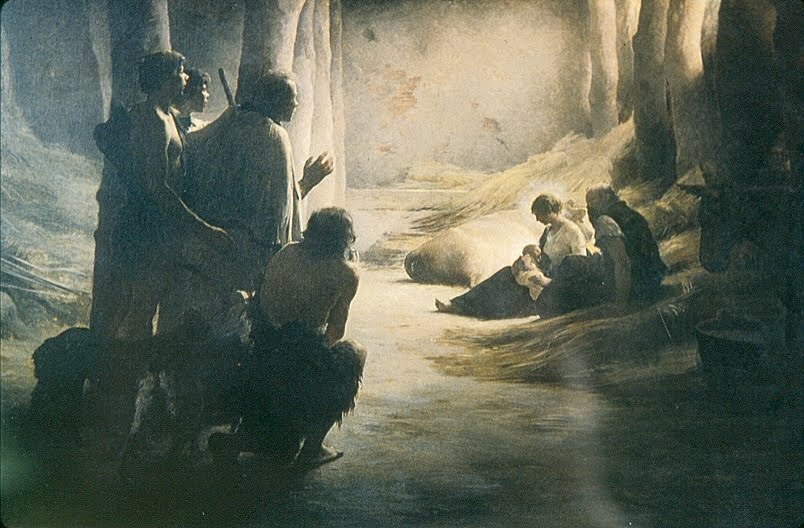There is an older gentleman at our church who is Greek. When biblical passages are discussed it is fascinating to listen to his viewpoints and to hear him explain certain words because of his knowledge of the Greek language, the original language of the New Testament. Is it any wonder I enjoy finding sources that expound on the Greek roots of biblical terms? I like to think it broadens my understanding somewhat. I was excited when I found the following:
” [Luke 2] Verse 7: “And she brought forth her firstborn son, and wrapped him in swaddling clothes, and laid him in a manger; because there was no room for them in the inn.”
Let’s pause to ponder this verse. We need to be aware of the culture of that time and region, and we need to learn one word from the original Greek text. In the Greek New Testament, the root from which inn was translated is kataluma. We don’t have an equivalent word in the English language. The Greek prefix kata- (or cata-) means “a bringing down.” We see it in English words such as catabolism, catastrophe, and cataclysm. When the prefix kata- was joined with the suffix -luma, it meant literally “a breaking down of a journey.” A kataluma was a guest chamber in a lodging place.
In those days an inn was not like a Holiday Inn or a Bethlehem Marriott. A lodging place in that part of Asia had to provide accommodations for traveling caravans, including the people and their animals. Caravans stayed at what was then known (and is still known) as a caravansary, or a khan. You may look in your own dictionary and find caravansary and khan, each defined as a rest house in some Asian countries.
Such a facility is typically rectangular in shape. It has a central courtyard for the animals that is surrounded by walled cubicles where the people rest. These quarters allowed guests to be elevated slightly above their animals with open doorways so that owners could watch over their animals.
The Joseph Smith Translation of Luke 2:7 indicates that there was no room for them in the “inns,” suggesting that all of the katalumas or cubicles of the caravansary were occupied. In the Greek New Testament the word kataluma appears in only two other passages, translated in each instance not as “inn” but as a “guestchamber,” which fits the concept that we have discussed.
As a youngster, whenever I heard those words “no room in the inn,” I assumed that No Vacancy signs were posted at local motels or that the innkeepers were inhospitable or even hostile. Such an assumption is probably way off the mark. People of that part of the world were no doubt then as they are now–most hospitable. Particularly would this have been true at a season when the normal population of Jerusalem and neighboring Bethlehem would be swollen with large numbers of relatives.
At a caravansary, animals were secured for the night in the center courtyard. In that courtyard there would have been donkeys and dogs, sheep, and possibly camels and oxen, along with all of the animals’ discharges and odors. Because the guest chambers surrounding the courtyard were filled, Joseph possibly made the decision to care for Mary’s delivery in the center courtyard of a caravansary–among the animals. There, in that lowly circumstance, the Lamb of God was born.” (Russell M. Nelson, Christ the Savior is Born)
Helps me develop a better picture in my mind of the conditions surrounding Jesus’s birth. We have farm animals. They are stinky creatures! Cleaning out stalls and coops is not the pleasantest of jobs. I can’t imagine how it must have been for Mary to give birth in such conditions knowing that her son, the Savior of the World, deserved much better. I do wonder too, how others there, who most assuredly saw her condition, could not have shown some kindness or courtesy giving up their own room.
“Even in our day, although two thousand years have passed, there are many who say the same thing that was said on that night in Bethlehem. ‘There is no room, no room’ (see Luke 2:7). We make room for the gifts, but sometimes no room is made for the giver. We have room for the commercialism of Christmas and even pleasure-seeking on the Sabbath day, but there are times when there is not room for worship. Our thoughts are filled with other things—there is no room.” (The Teachings of Howard W. Hunter, edited by Clyde J. Williams [Salt Lake City: Bookcraft, 1997], 42.)
Am I making room for Him? Oh sure, I say my prayers and try to read the scriptures but many times at the end of the day I’ve found I’m only going through the motions, I have no recollection of what I prayed or read about. As Pres. Hunter stated, “[My] thoughts are filled with other things.” This is a constant struggle to really allow Christ to enter first before my “inn” becomes too full.
“Each of us is an innkeeper who decides if there is room for Jesus!” (Neal A. Maxwell, “Settle This in Your Hearts,” Ensign, Nov. 1992, 66)
I have to find quiet solitude, even if just for five minutes, where I can study, pray, focus. Singing the words to a hymn in the morning helps to keep the tune of the hymn on my mind throughout the day. I’ll find myself humming it when rocking the baby to sleep. My days run so much smoother, or rather, I’m better able to handle the stresses of motherhood, when I “make room for Jesus.”
So why don’t I?
Everyday?

© 2007-2009 Chocolate on my Cranium, LLC all rights reserved

Leave a Reply